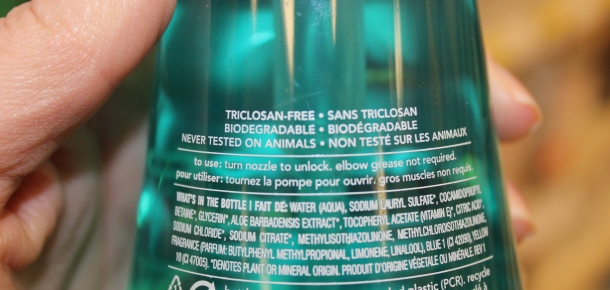Many popular antibacterial soap products are being questioned for safety and effectiveness by the federal government. The Food and Drug Administration (FDA) wants proof that the germ-fighting chemicals in these products are safe, and that they work better than plain soap and water.
The FDA is concerned about two chemicals in particular, triclosan and triclocarban. For nearly 20 years, researchers have warned about the dangers of these two chemicals, which are used in most antibacterial products, but little has been done to regulate their use.
In a recent Young and Healthy article, Dr. David Haslam, one of our infectious diseases experts, described the concern with these chemicals: “Triclosan and triclocarban are not like the well-characterized antibiotics that doctors use to treat bacterial infections. Instead, triclosan is a chemical that damages bacteria in ways that are not well-understood. Surprisingly, triclosan-induced damage makes bacteria respond in a way that makes them partially resistant to standard antibiotics.”
This means that triclosan and its cousin triclocarban, are likely contributing to the growth of antibiotic-resistant “super bugs.”
With this information, I decided it was time to check products in my home and make a concerted effort to remove them and find new products for my family. Studies have already indicated that washing hands with plain soap and water is as effective as using an antibacterial soap, so the change seemed like a no-brainer.
When I started looking at the products in my home, I was disappointed to discover that the hand soap that we’ve been using for the last several years does indeed have triclosan in it. Our bar soaps and body washes were all free of the chemical, as were our laundry detergents.
*It should be noted here that there are many other antibacterial/antimicrobial products on the market that also have these chemicals in them. A quick search will turn up several lists of products and types of products. I have no way of knowing how accurate or complete the lists are, so I won’t link to any of them here, but if you’re interested in learning more, please search and use the information as you see appropriate.
So, finding new hand soap was my mission. I set off to my favorite big box store wondering how tough it would be to find a “plain old soap” option.
And you know what – it wasn’t hard at all! Honestly, the brand that I’d been buying for so long and the store version of that brand were the only soaps that had triclosan in them. The foaming version of that brand had three times as much as the non-foaming, yikes!
But every other brand was free of triclosan. Many of the packages stated specifically that the product was triclosan-free, and it’s easy to identify the ones that do have the chemical, as it is required to be listed in a drug facts information box on the back of each product.
We’ve now made the switch at home and I’m watching to see what happens with the FDA inquiry.
If the FDA gets its way, manufacturers will have to prove the safety of all soap products labeled “antibacterial” and “antimicrobial,” reformulate them, or take them off the shelves by 2016. As many as 2,000 products could be affected.
Most “leave on” hand sanitizers and antibacterial wipes do not contain the targeted ingredients. And the FDA proposal will not affect the antibacterial products used in hospitals.
Dr. Haslam says that the FDA is currently assessing input from scientists, consumers, environmental groups, and industry representatives before taking the next steps. In the meantime, he offers this advice to parents.
“Both alcohol-containing hand sanitizers (such as Purell) or plain soap and water are effective ways to decrease bacteria and virus carriage, and decrease person-to-person transmission of infections.”

